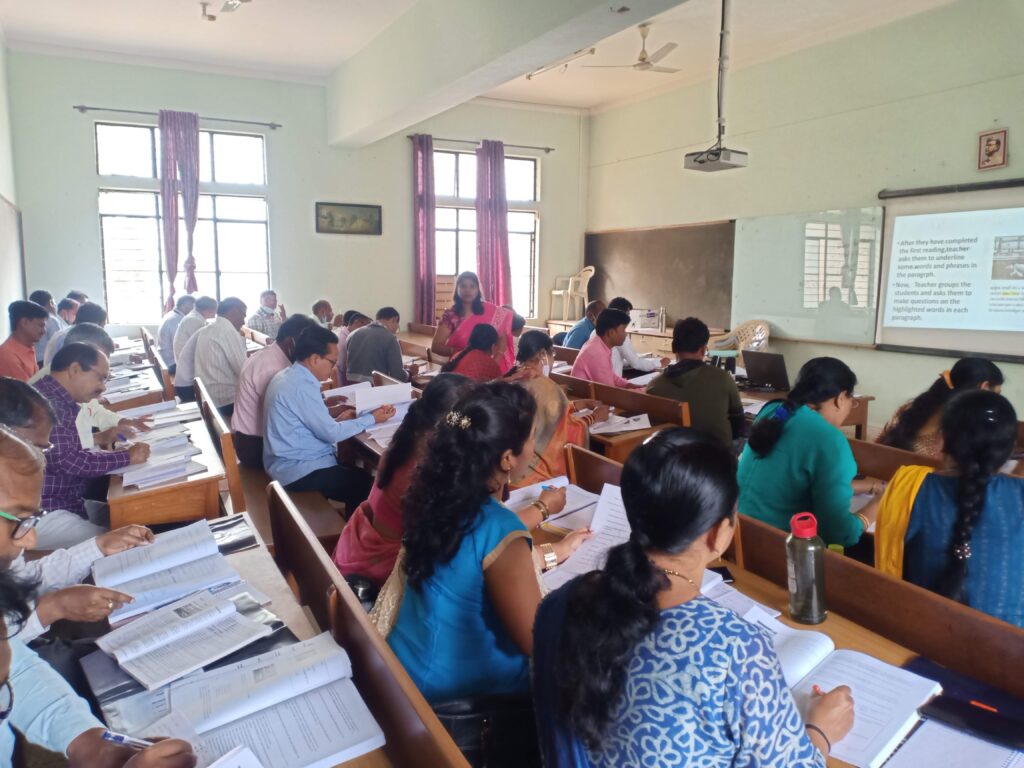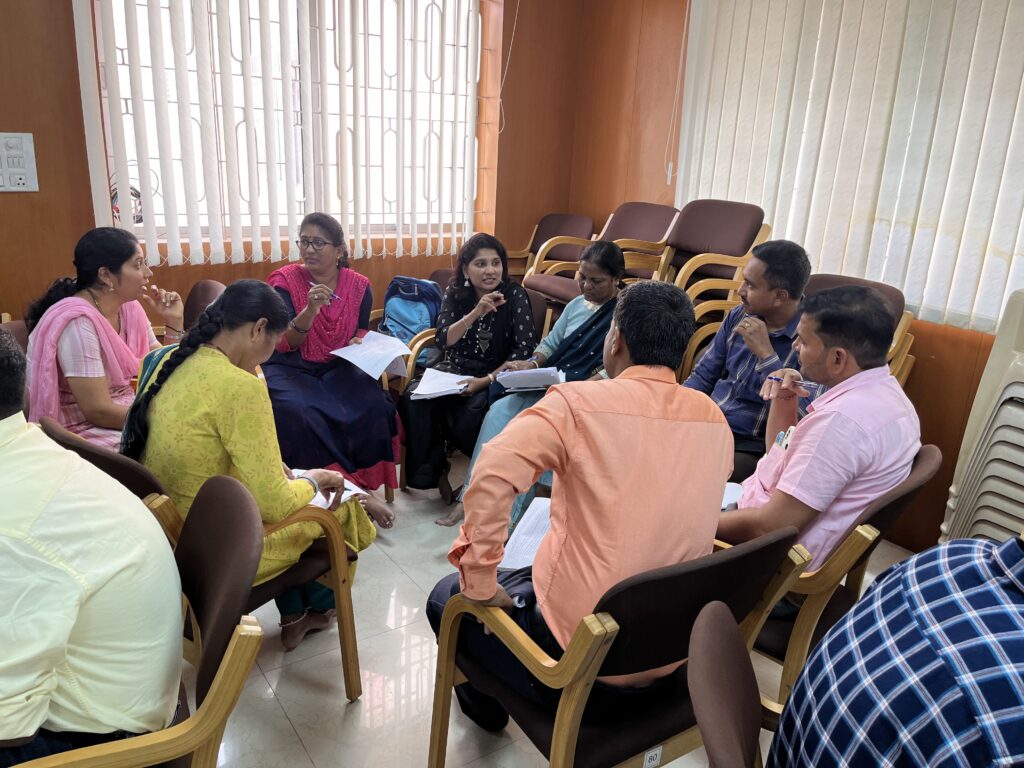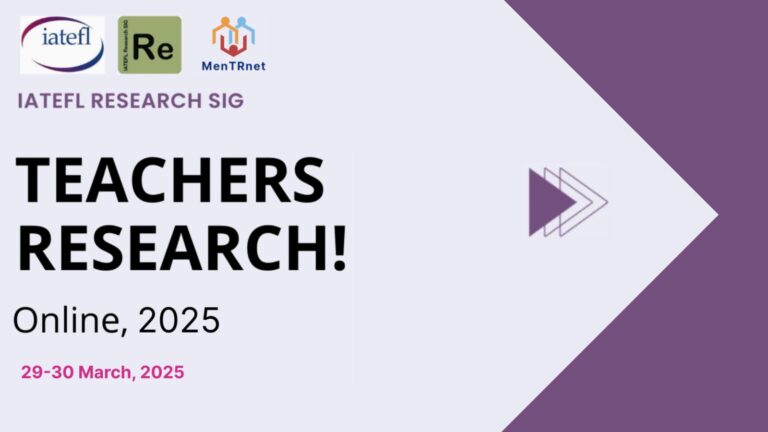
As part of the International Festival of Mentoring Teacher-Research (2024-2025), three mentors talked about their experiences of mentoring large groups of teacher-researchers. Here, Ravinarayan Chakrakodi shares his insights from a project in Bengaluru, India.
Teacher-research mentoring is an integral part of the one-month, in-service teacher training programmes we conduct at the Regional Institute of English South India (RIESI), Bengaluru for in-service teachers of primary and secondary schools. In each cohort, there are 70 to 80 teachers on average, who belong to different age groups and have varied teaching experiences and language proficiency levels. Since the introduction of Exploratory Action Research (EAR) at RIESI in 2018, over 2000 teachers have been trained to carry out EAR, making it an integral part of professional development for teachers.
In this post, I will discuss how I have mentored large groups of teachers, focusing on one cohort as an example. I will share some of the key principles and strategies I have followed for teacher-research mentoring and present the session structures, outcomes, and challenges in supporting teachers to engage in EAR.
Principles and strategies for mentoring teacher-researchers
To effectively mentor large groups of teachers in teacher-research, I follow certain key principles and strategies. A foundational strategy is creating a safe environment. This is crucial, as it encourages open discussions where teachers feel comfortable sharing their challenges and seeking guidance.
Setting goals and clarifying objectives is another important strategy that helps teachers understand the purpose and outcomes of engaging in EAR. It is also necessary to provide input and relevant materials for successful teacher-research mentoring. Resources such as the RIESI training module handbook, A Handbook for Exploratory Action Research (Smith & Rebolledo, 2018), EAR reports on the RIESI website, Teachers Research! Online conference presentations, and IATEFL ReSIG publications support input for teachers throughout their research journey.
Providing opportunities to collaborate, another strategy that I use, plays a vital role, as peer mentoring and group discussions help in motivating and involving all, and in building collective knowledge. Moreover, being flexible and accessible is essential as it ensures that engagement extends beyond structured sessions, allowing continuous learning and support.
In response to the challenges that I experienced with past cohorts, I also follow a few other important principles and strategies such as using a case study approach, celebrating small wins, and encouraging peer mentoring. Using a case study approach by presenting real-life examples from previous successful teacher research projects and presentations at the Teachers Research! Online conferences helps teachers visualize the process. Celebrating small wins is essential, as acknowledging teachers’ progress at each stage of their research keeps motivation high. Peer mentoring strengthens support networks by establishing mentor groups to provide guidance throughout the research process.
Structure of mentoring sessions
For the purpose of this blog post, I will focus on one cohort of teacher-researchers. During the one-month training, teachers mainly focused on carrying out Exploratory Research. They conducted Action Research after the completion of the training back in their respective schools.
The mentoring process was carefully structured across multiple sessions with clearly defined goals and roles. Each session was built on the previous one and the structured progression – from individual reflection to group collaboration, and finally to mentoring others and presenting findings – ensured effective mentoring despite the large cohort size. Having a predefined sequence of activities ensured that mentoring was coherent, systematic, and inclusive.

The mentoring process is summarised in Table 1 below:
Table 1: Mentoring process
| Sessions | Topic | Lead role |
| 1 | Success stories | Teachers |
| 2 | EAR and its components | Teacher Educator (Lead Mentor) |
| 3 | Reading the Handbook for EAR | Teachers |
| 4 | Identifying classroom challenges and collaborative research | Teachers |
| 5&6 | Mentoring TRs | Peer Mentors |
| 7 | Mini-conference and presentations | Teachers and peer mentors |
I began my mentoring sessions with success stories, where teachers narrated experiences from their classrooms that they considered successful. They reflected following the prompt questions given below:
- What particular successful experiences have you had recently?
- Why do you think it was a success?
- Did you get any feedback from others (students/colleagues/parents/officers)?
- How can you generate more such successes in future?
(Adapted from Smith, Eraldemir Tuyan, Békés, & Serra, 2021)
In the second session, I introduced EAR and its components to teachers. The EAR process was broken down into manageable steps, including identifying classroom challenges, data collection methods and tools, data analysis, interpretation, action planning, implementing change, and sharing results.
In the third session, teachers were divided into eight groups, with 8 to 10 members in each group. Each group was assigned a chapter from A Handbook for Exploratory Action Research (2018) by Richard Smith and Paula Rebolledo. Each group presented a summary of the chapter they read in the next session, facilitating a deeper understanding of EAR stages through peer learning.
The fourth session focused on identifying classroom challenges and collaborative research. Teachers engaged in group discussions about the challenges and difficulties they faced professionally as teachers of English. Research groups were formed based on shared topics, and a peer mentor was chosen for each group. The TR (teacher research) mentor was selected by the members of the group based on his/her willingness and interest to mentor the peer group.
During the next stage, when teachers were working mainly in groups, I spent some extra time with the peer mentors discussing mentoring in general, TR mentoring, attributes of a TR mentor, importance of TR mentoring, roles and responsibilities of a TR mentor, and so on, encouraging them to read chapters from the book Mentoring teachers to research their classrooms: A practical handbook (Smith, 2020) as a basis for their work with teachers in groups.
With their peer mentors, the groups worked collaboratively to identify research questions, select data collection methods, and provide feedback, collaborating beyond formal sessions. Peer collaboration was central to the mentoring process. After teachers had been groups based on shared interests, they engaged in regular group discussions to co-construct research questions and provide feedback on each other’s plans and, later, findings. The residential nature of the programme provided additional informal opportunities for collaboration, as teachers often met after sessions to share insights and support each other. This peer-led interaction developed a sense of ownership, community, and shared learning, which was critical to sustaining motivation and progress in such a large cohort.

In sessions 5 and 6, mentors reported on the work being done by the teacher-researchers, sought clarifications, and shared their uncertainties and challenges. I further engaged them in mentoring conversations and focused on probing, clarifying and guiding teachers as they refined their research. The sessions culminated in a mini conference and plenary presentations, allowing teachers to share their findings and reflect on their learning experiences.
Communication channels and quality assurance in large-scale mentoring
For better communication and to maintain consistency and quality in such a large mentoring programme, a multi-layered support system was put in place. A dedicated WhatsApp group for TR mentors facilitated daily check-ins, progress updates, and problem-solving discussions. This digital backchannel allowed me to monitor developments in real-time and offer immediate guidance when needed. Mentors were encouraged to document their group’s milestones and challenges, which helped in tracking each group’s progress. Additionally, reflective journals, using Google forms, were maintained to capture the mentoring process and identify gaps and reinforce learning. These strategies collectively ensured quality, accountability, and responsiveness throughout the mentoring journey.
Outcomes of mentoring
The mentoring initiative has had a significant impact on classroom practices and teachers’ Continuing Professional Development (CPD). It has helped improve teachers’ language proficiency and teaching skills. Some teachers have presented their reports at seminars and conferences, while others have undertaken EAR projects in collaboration with their respective State Councils of Educational Research and Training (SCERTs) and with the British Council. A few teachers have expressed interest in higher studies, including pursuing PhD programmes. Some have presented their research at Teachers Research! Online conferences, contributing to the growing body of knowledge in teacher research.
Challenges faced
Despite its success, I have encountered a few challenges in mentoring teacher researchers in general, and specific difficulties when working with large groups in particular. Limited time is a major constraint, restricting opportunities for in-depth mentoring. Language barriers also pose a challenge, as interactions are primarily in English, making it difficult for some teachers to fully engage with the EAR process. While many teachers successfully conduct Exploratory Research during the one-month training programme, fewer progress to the Action Research phase due to various constraints. A key reason for this is my own limitation in providing individual attention and supporting teachers in sustaining their motivation for research after the training, especially when working with large groups (see, though, my chapter about this in the book Stories of mentoring teacher-research (Smith, Eraldemir Tuyan, Serra & Békés, 2024).
Conclusion
Mentoring large groups of teachers in teacher-research is both challenging and rewarding. By creating an inclusive and supportive environment, providing structured yet flexible mentoring, and promoting peer collaboration, teachers can successfully engage in EAR. The initiative at RIESI Bengaluru has demonstrated that it is possible to mentor large groups effectively through the creative use of peer mentors and also the very defined sequencing of training that really scaffolds the teachers not just in EAR, but also in mentoring each other.
Addressing challenges such as language barriers, time constraints and sustenance of teacher motivation could further enhance the effectiveness of the programme, ensuring that more teachers complete the full cycle of Exploratory Action Research and contribute meaningfully to their own professional development and their students’ learning experiences. I am also interested in the possibility of enhancing support for the peer mentors, since their role is crucial to the success of the overall large-group mentoring experience.
References
Smith, R. (2020). Mentoring teachers to research their classrooms: A practical handbook. British Council India.
Smith, R., & Rebolledo, P. (2018). A handbook for exploratory action research. British Council.
Smith, R., Eraldemir Tuyan, S., Békés, E. Á., & Serra, M. (2021). Enhancement mentoring for teacher-research: A positive approach in a crisis. English Language Teacher Education and Development (ELTED) Journal, 24, 43–61.
Smith, R., Eraldemir Tuyan, S.,Serra, M. & Békés, E. Á. (2024). Stories of mentoring teacher-research. IATEFL.
About the Author(s)

Ravinarayan Chakrakodi
Dr. Ravinarayan Chakrakodi is Professor and Academic Head at the Regional Institute of English South India (RIESI), Bengaluru and has over 18 years of experience in teacher training and teacher education. He was the Project Lead for ‘Introducing Multilingual Pedagogy in Classrooms’ at RIESI and served as Lead Coordinator for the British Council’s Action Research Mentoring Scheme (ARMS) in 2019–20. Dr. Chakrakodi holds an MA in TESOL with Distinction from the University of Lancaster, UK, and is committed to promoting reflective practice and multilingual approaches in English language education.


